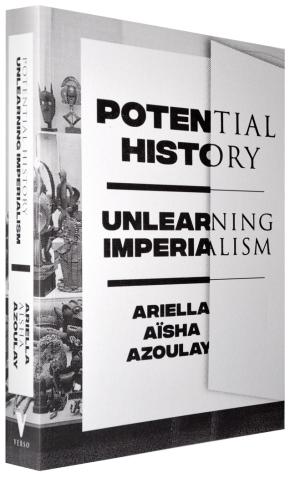Potential History: Unlearning Imperialism, by Ariella Aisha Azoulay (2019)
 What Are Reparations?
What Are Reparations?
Every once in a while, like a seasonal phenomenon, responses have to be given about reparations claims, as if they’re a ticking bomb to be defused. Responses mostly focus on how to quell claimants’ urgency and buy the time necessary for these demands to appear again as if they come after the violence. When in May 1969, James Forman interrupted the Sunday morning communion at New York’s Riverside Church in order to read a few demands from the “Black Manifesto,” he ended with a comment on temporality, stating, “Our patience is thin, time is running out; we have been slaves too long.”
The deferral of reparations, though, is not only strategic but part of the imperial onto-epistemological order that makes victims’ descendants who are asking for reparations appear to turn toward the past, while perpetrators’ descendants congratulate themselves on looking forward to the future. Bringing the question of reparations back to its origins is necessary in order to address them outside of the vicious circle of imperial violence. We should locate the origin of reparations in the moment when this violence is not yet a lingua franca and its reversibility is possible: when that which should not have been possible is at the same time that which could not ever have been possible. For that, rights such as the right not to be a perpetrator or the right to care for the shared world should not be conceived as new rights but rather should be assumed as preexistent rights that were violated when worlds started to be destroyed.
These imperial rights, invented in the late fifteenth century, should still be conceived as new rights that can be revoked since they structurally undermine the care of a shared world, and as the basis of imperial political regimes, define only two possible modes of existing in the world: being a victim of the regime or a perpetrator in its service. In the absence of a closure to these crimes, those who inherited wealth and power through others’ dispossession not only continue to occupy positions of authority and privilege, but also continue to rely on the same tropes that render dispossessed people into a “problem” that ”experts have the right “to solve”—as in “the refugee problem,” the “negro problem,” or the problems of a “high birth-rate” or “progress-resistant” culture.
No pressure was exerted on perpetrators of imperial crimes to pay for their crimes, seek forgiveness from their victims, unlearn their rights, dismantle the structures that enable them, and step back from their positions. The afterlife of slavery was made the affair of the descendants of slaves, and the destruction of Palestine, Palestinians’ affair. Perpetrators are not incriminated, nor did they assume responsibility, despite the wealth of information regarding the violence they exerted. Sparing enslavers and their descendants any accountability is to imply that the abolition of slavery continues to mean amnesty for its crimes.
Institutionalized violence shapes who people are—victims and perpetrators alike—to an extent that only the recovery of the condition of plurality can undo it. This points to the most basic right immanent to the human condition, which imperialism constantly compromises: the right not to act against others; in its positive formulation: the right to act alongside and with one another. “Accepting this right in its two forms as fundamental is necessary in order to imagine reparations, so the bliss of being active and repairing what was broken can be attained.
To proceed further in this direction, we have to join others who have long been asking the same questions. In the petition that Sojourner Truth wrote at the end of the Civil War, she alludes to America’s debt to her people, but makes it immediately clear that this debt cannot be reduced to monetary terms: “I shall make them understand that there is a debt to the Negro people which they can never repay.” This does not mean that the labor of reparations is superfluous. Reparations narratives, like Truth’s, are told through repetition: the speaker always conveys the same urgency, the same persuasiveness, and the same hopefulness that just claims will be recognized, no matter how much time has passed since the demand was put forward.
(…)
Counter to history
The challenge here is not to justify reparations for descendants of the victims of slavery, survivors of colonial genocides, and the destruction of cultures; this is assumed to be beyond need of justification. Reparations are structurally postponed through the demand for a “well-documented case,” which would adequately justify the need for reparations through archival documents that could “withstand scientific scrutiny and be verifiable to the satisfaction of the court or tribunal,” even though such documents could only have been produced by the perpetrators.
The challenge is to make the case for reparations a priority for descendants of the perpetrators too, as well as to all those who inherit and are trained to operate imperial technologies. This effort should be undertaken based on the conviction that descendants of perpetrators have the right not to be forever perpetrators, hence the right to have the right not to be forever perpetrators, hence the right to stop reproducing imperial violence and partaking in the destruction of our shared world. To exercise this right, perpetrators’ descendants should reach out to those who have kept this option open for them: victims’ descendants.
Giving back what was unjustly inherited should not be an act dependent on a particular claimant, but a way to exercise one’s basic right to be able to share the world. Without criminalizing what is still held as neutral—the accumulation of wealth, profit, and power—denouncing imperial crimes associated with specific dates and places will not be enough to make people relinquish positions of power and institutionalized violence. For such renunciation to be perceived as a desirable, necessary bliss of doing the right thing, people must reclaim the right to step back from and undo positions of power.
Averting this relentless imperial movement requires declining to partake in progress—reversing speed into slowness, turning growth into degrowth, repurposing existing technologies toward reparations rather than inventing new ones, relinquishing accumulation and redistributing assets, rescinding gratuitous private ownership, renouncing symbolic violence and redefining the roles through which it is exercised, and transmuting “expertise” into knowledge that is local, sustainable, and possible to share outside of imperial technologies. Simply put, in order for reparations claims to be transformative, perpetrators cannot continue to occupy the same positions of power and knowledge, from which they would remain authorized to decide, on the basis of imperially accumulated “expertise,” what should be given, and when and how it is to be given, to victims. Nor should any of these positions, from which abuse was legalized, continue to exist as they do now.”
(…)
 Jaguar, AfricaMuseum, Tervuren, Belgium. Courtesy of IBB
Jaguar, AfricaMuseum, Tervuren, Belgium. Courtesy of IBB
The Labor of Forgiveness
Perpetrators and their descendants cannot decide on the nature of reparations, and they cannot extend them to others. An act of imagination is needed here, one that will allow us to recall that the political realm could be different, not only one that consists of the rulers and the ruled, perpetrators and victims, whites and non-whites, grantors and claimants of rights. An act of potential history would see descendants of perpetrators in the position their ancestors should have been in when crimes were perpetrated—that of returning what was taken and begging to be allowed a place in the shared world. Such a space is the cause and effect of hard work through which perpetrators and their descendants can separate themselves from the crime; that is, not through denial but through its transformation into an unforgivable crime.
The work of reparations is not about to begin—it didn’t stop. It was never dependent on the dubious generosity of perpetrators. These claims consisted first and foremost of the tedious labor of world-building resting on the firm assertion that violence inflicted was and is forever unforgivable, even if individuals could be and are being forgiven. This assertion was transmitted throughout generations, and no perpetrator could steal it. This assertion began at the moment of dispossession.
Forgiveness, in the sense that I describe it here, is not a “communication act” between the ones who ask for it and the ones who grant it; it is not about issuing the right words that will reward perpetrators with victims’ grace. It is neither an abstract term, nor a “leap” of belief, decision, or will, as some philosophers falsely and arrogantly argue. Forgiveness is not predicated on forgetting the crime, nor is it a form of relinquishment of one’s pain, longing, rage, frustration, or the intimate knowledge that the loss cannot be retrieved. Forgiveness is, rather, labor: it is the hard work of drawing the line of the unforgivable, way before one is ready to consider to forgive individual perpetrators.
To render unforgivable the violence that was institutionalized as a regime-made disaster is the tedious labor of world-recovery. Only by making crimes forever unforgivable can the world be habitable again. For perpetrators or their descendants to be forgiven, recognized as people with whom it is no longer a disgrace, a threat, and a danger to share a world, their or their ancestors’ violent acts should be firmly assumed as no longer possible and forever unforgivable. There is no room for explanations, reasons, justifications, or attenuating circumstances in the labor of forgiveness.
For perpetrators to participate in the labor of forgiveness, they should be tuned to victims’ onto-epistemologies of recovery. These have little to do with neoliberal policies, experts’ bodies of knowledge, and unassailable ideas of growth and profit and progress; rather, it is the backward-thrusting work of opening all the shutters backward so that whatever was broken could be attended to. This is not politics of apology and forgiveness run by politicians. This is the tedious labor of making the world fit to live in together.
(…)
Only when a shared onto-epistemic order in which these crimes are unforgivable is agreed upon by descendants of perpetrators and victims can the world no longer be experienced along differential lines. These are the conditions of repair and of bliss.
The labor of forgiveness and repair must be pursued regardless of the readiness of the victims to open any door for their perpetrators. Forgiveness is the labor of making life on earth sustainable again. Out of necessity or choice, all those who have been linked by violence continue to share the same world, and so this work must be pursued by all, in coordination or not.
In the shared world the labor of forgiveness is rehearsed over and over, and it could be actualized at any moment. Nothing can be considered in advance to be sufficient, and nothing can ensure completion. That this labor is pursued is already a sign that starting anew—imagining otherwise—is possible.